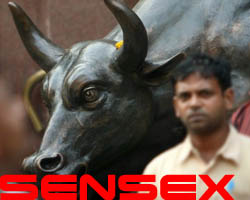World Market Review by Nirmal Bang
 U.S. stocks rose, while Treasuries and the dollar slipped, after a rebound in oil and natural gas spurred investors into more bets on riskier assets. Stocks fell earlier as the declines in fuel prices dragged down energy shares and regulators boosted the number of “problem banks” to a 15?year high. The Federal Deposit Insurance Corp.’s list of troubled lenders grew 36% to 416.
U.S. stocks rose, while Treasuries and the dollar slipped, after a rebound in oil and natural gas spurred investors into more bets on riskier assets. Stocks fell earlier as the declines in fuel prices dragged down energy shares and regulators boosted the number of “problem banks” to a 15?year high. The Federal Deposit Insurance Corp.’s list of troubled lenders grew 36% to 416.
American International Group Inc. soared 27%, leading financial stocks higher, on speculation the company may benefit from improved relations with its former chief executive officer. Citigroup Inc. jumped 9.1% after the New York Post reported that hedge?fund manager John Paulson is buying the shares.
GDP shrank at a 1% annual rate from April to June, less than the 1.5% decline projected by economists in a Bloomberg News survey.
Government programs, including the “cash?for?clunkers” and firsttime homebuyer incentives, are boosting manufacturing and housing, indicating the gain in sales that began last quarter will be sustained in the second half of the year.
Japan’s unemployment rate rose to a record 5.7% in July and deflation worsened, dealing a blow to Prime Minister Taro Aso on the eve of an election that polls indicate his ruling Liberal Democratic Party will lose. The jobless rate surpassed the previous worst of 5.5% last seen in April 2003, the statistics bureau said today in Tokyo.
Economists surveyed by Bloomberg predicted an increase to 5.5% from 5.4% in June. Consumer prices dropped an unprecedented 2.2% from a year earlier.
Asian stocks rose, sending the MSCI Asia Pacific Index to its second weekly advance in three, as commodity prices and Dell Inc. profit beat analyst estimates.
India’s central bank indicated it may raise borrowing costs as the “accommodative” policy it started in October threatens to stoke inflation. While growth has yet to return to pre?crisis levels, Governor Duvvuri Subbarao’s comments suggest that the risk of accelerating inflation has now become a higher priority. Still, withdrawing the cheap money available in the economy runs the risk of weakening the “recovery impulses,” while sustaining it for a protracted phase “can only increase inflation in future,” the central bank said today. “More importantly, the deficient monsoon could affect the inflation outlook more than the growth prospects,” according to the report.
Excess rain over central, southern and northeastern regions in the past week narrowed the deficit in the week ended Aug. 26 to 5%. Showers since June 1 were 25% below the long?period average, compared with 26% a week ago.